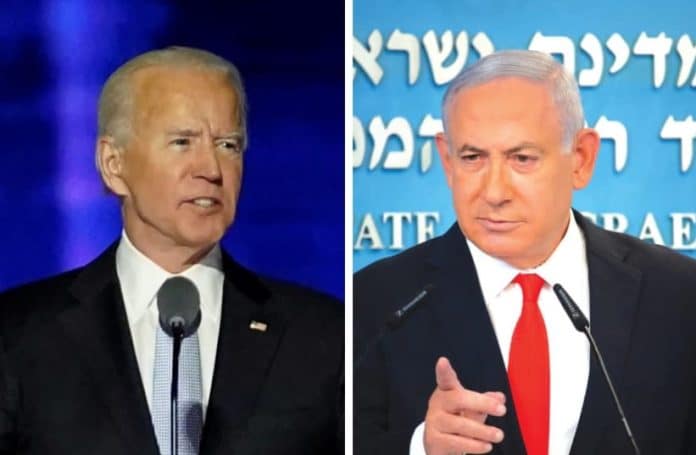U.S. President Joe Biden told reporters on Friday night that a two-state solution is possible with Israel’s Prime Minister Benjamin Netanyahu, despite what the Israeli leader said publicly in recent days.
The Israeli leader later issued a statement underscoring his opposition to a Palestinian state.
At the same time, diplomatic efforts continued in order to outline a day-after the Israel-Hamas war, with pushes toward a two-state solution, as discussed by Biden and a New York Times reporter close to the administration, Thomas Friedman.
Friedman summarized the Biden strategy in a Friday column for the NYT, to force Netanyahu to either “reject any collaboration with Palestinians” and “go down in history as the leader who presided over Oct. 7,” or cooperate with international diplomatic efforts and “be the Israeli leader who delivered a Palestinian state able to guarantee Israeli security and opened the road to peace with the Saudis and the wider Muslim world.”
Outlining the plan as starting with a short-term ceasefire deal to release hostages, held in Gaza since the Hamas-led October 7 attacks, then allowing Palestinians to administratively manage the Strip.
“With the promise of eventual Palestinian control — some kind an Arab multinational force would be prepared to move in. A lot would depend, though, on the state of Hamas’s military forces and whether Hamas’s surviving leaders and maybe some senior fighters would be allowed to go to a third country,” Friedman added, citing a senior U.S. official.
As part of the reported plan, the Palestinian Authority would then go through a process of reform which would include elections, and “the West and Arab states would help this authority build proper institutions, including a security force for Gaza and the West Bank.” At the same time, the normalization of relations between Saudi Arabia and other Muslim-majority nations would start taking place.
In regards to Biden’s comments on Netanyahu being open to a two-station solution, and how that might look like, the U.S. President said “there are a number of types of two-state solutions.”
“There’s a number of countries that are members of the UN that are still — don’t have their own militaries. Number of states that have limitations on … And so I think there’s ways in which this could work,” Biden explained.
Biden and Netanyahu discussed attributes of a future Palestinian state in a “detailed” and “serious” conversation, a person familiar with the conversation told CNN.
Netanyahu’s office issued a statement clarifying the leader’s stance.
“In his conversation last night with President Biden, Prime Minister Netanyahu repeated his consistent position for years, which he also expressed at a press conference the day before: after the elimination of Hamas, Israel must remain in full security control of the Gaza Strip to ensure that Gaza will no longer pose a threat to Israel, and this conflicts with the demand for Palestinian sovereignty.”













